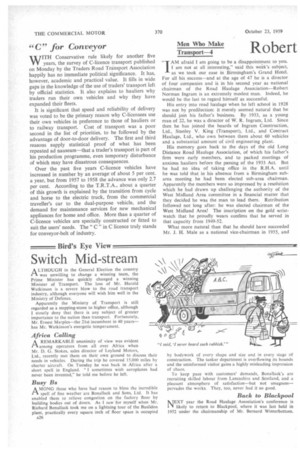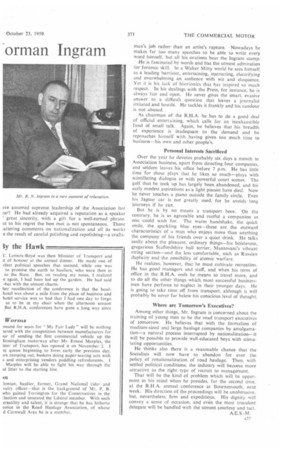Men Who Make Transport-4
Page 28

Page 29

If you've noticed an error in this article please click here to report it so we can fix it.
Robert orman Ingram
"TAM afraid I am going to be a disappointment to you. I am not at all interesting," said this week's subject, as we took our ease in Birmingham's Grand Hotel. For all his success—and at the age of 47 he is a director of four companies and is in his second year as national chairman of the Road Haulage Association—Robert Norman Ingram is an extremely modest man. Indeed, he would be the last to regard himself as successful.
His entry into road haulage when he left school in 1928 was not by predilection: it merely seemed natural that he should join his father's business. By 1933, as a young man of 22, he was a director of W. R. Ingram, Ltd. Since then he has joined the boards of Ingram Construction, Ltd., Stanley V. King (Transport), Ltd., and Contract Haulage, Ltd., who own between them about 60 vehicles and a substantial amount of civil engineering plant.
His memory goes back to the days of the old Long Distance Road Haulage Association, of which his father's firm were early members, and to packed meetings of anxious hauliers before the passing of the 1933 Act. But he had no idea of taking office in the R.H.A. until he was told that in his absence from a Birmingham subarea meeting he had been elected sub-area chairman. Apparently the members were so impressed by a resolution which he had drawn up challenging the authority of the West Midland Area committee in a financial matter that they decided he was the man to lead them. Retribution followed not long after: he was elected chairman of the West Midland Area! The inscription on the gold wristwatch that he proudly wears confims that he served in that capacity from 1949-52.
What more natural than that he should have succeeded Mr. J. H. Male as a national vice-chairman in 1955, and
tve assumed supreme leadership of the Association last :ar? He had already acquired a reputation as a speaker great sincerity, with a gift for a well-turned phrase. at to his regret the bon mot is not spontaneous. Those tattering comments on nationalization and all its works e the result of careful polishing and repolishing—a crafts man's job rather than an artist's rapture. Nowadays he makes far too many speeches to be able to write every word himself, but all his orations bear the Ingram stamp.
He is fascinated by words and h'as the utmost admiration for forensic skill. In a Walter Mitty world he sees himself as a leading barrister, entertaining, instructing, electrifying and overwhelming an audience with wit and eloquence. Yet it is his lack of histrionics that has inspired so much respect. In his dealings with the Press, for instance, he is always fair and open. He never gives the smart, evasive answer to a difficult question that leaves a journalist irritated and hostile. He tackles it frankly and his candour is not abused.
As chairman of the R.H.A. he has to do a good deal of official entertaining, which calls for an inexhaustible fund of small talk. Again, he believes that his breadth of experience is inadequate to the demand and he reproaches himself with having given too much time to business—his own and other people's.
Personal Interests Sacrificed




































































































